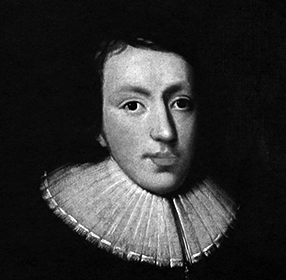When I Consider How My Light Is Spent
When I consider how my light is spent,
Ere half my days in this dark world and wide,
And that one talent which is death to hide
Lodged with me useless, though my soul more bent
To serve therewith my Maker, and present
My true account, lest He returning chide;
“Doth God exact day-labor, light denied?”
I fondly ask. But Patience, to prevent
That murmur, soon replies, “God doth not need
Either man’s work or His own gifts. Who best
Bear His mild yoke, they serve Him best. His state
Is kingly: thousands at His bidding speed,
And post o’er land and ocean without rest;
They also serve who only stand and wait.”
This poem is in the public domain.
Composed sometime between 1652 and 1655, John Milton's "Sonnet 19 [When I consider how my light is spent]" grapples with the subject of the poet's blindness later in life, as well as his changing relationship with God. Many of Milton's best-known poems, including the epic work Paradise Lost, were composed through dictation, transcribed by others, including the poet's daughters and the English metaphysical poet Andrew Marvell.

